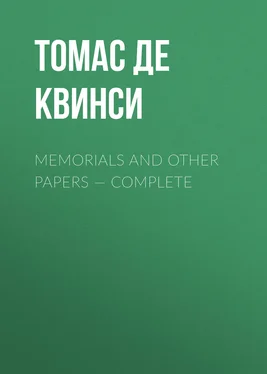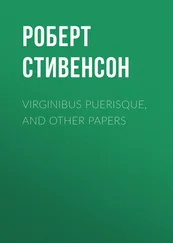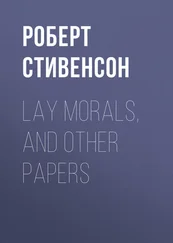Томас Де Квинси - Memorials and Other Papers — Complete
Здесь есть возможность читать онлайн «Томас Де Квинси - Memorials and Other Papers — Complete» — ознакомительный отрывок электронной книги совершенно бесплатно, а после прочтения отрывка купить полную версию. В некоторых случаях можно слушать аудио, скачать через торрент в формате fb2 и присутствует краткое содержание. Жанр: foreign_prose, literature_19, foreign_antique, на английском языке. Описание произведения, (предисловие) а так же отзывы посетителей доступны на портале библиотеки ЛибКат.
- Название:Memorials and Other Papers — Complete
- Автор:
- Жанр:
- Год:неизвестен
- ISBN:нет данных
- Рейтинг книги:5 / 5. Голосов: 1
-
Избранное:Добавить в избранное
- Отзывы:
-
Ваша оценка:
- 100
- 1
- 2
- 3
- 4
- 5
Memorials and Other Papers — Complete: краткое содержание, описание и аннотация
Предлагаем к чтению аннотацию, описание, краткое содержание или предисловие (зависит от того, что написал сам автор книги «Memorials and Other Papers — Complete»). Если вы не нашли необходимую информацию о книге — напишите в комментариях, мы постараемся отыскать её.
Memorials and Other Papers — Complete — читать онлайн ознакомительный отрывок
Ниже представлен текст книги, разбитый по страницам. Система сохранения места последней прочитанной страницы, позволяет с удобством читать онлайн бесплатно книгу «Memorials and Other Papers — Complete», без необходимости каждый раз заново искать на чём Вы остановились. Поставьте закладку, и сможете в любой момент перейти на страницу, на которой закончили чтение.
Интервал:
Закладка:
What is a university almost everywhere else? It announces little more, as respects the academic buildings, than that here is to be found the place of rendezvous—the exchange, as it were, or, under a different figure, the palćstra of the various parties connected with the prosecution of liberal studies. This is their "House of Call," their general place of muster and parade. Here it is that the professors and the students converge, with the certainty of meeting each other. Here, in short, are the lecture-rooms in all the faculties. Well: thus far we see an arrangement of convenience—that is, of convenience for one of the parties, namely, the professors. To them it spares the disagreeable circumstances connected with a private reception of their students at their own rooms. But to the students it is a pure matter of indifference. In all this there is certainly no service done to the cause of good learning, which merits a state sanction, or the aid of national funds. Next, however, comes an academic library, sometimes a good one; and here commences a real use in giving a national station to such institutions, because their durable and monumental existence, liable to no flux or decay from individual caprice, or accidents of life, and their authentic station, as expressions of the national grandeur, point them out to the bequests of patriotic citizens. They fall also under the benefit of another principle—the conservative feeling of amateurship. Several great collections have been bequeathed to the British Museum, for instance—not chiefly as a national institution, and under feelings of nationality, but because, being such, it was also permanent; and thus the painful labors of collecting were guaranteed from perishing. Independently of all this, I, for my part, willingly behold the surplus of national funds dedicated to the consecration, as it were, of learning, by raising temples to its honor, even where they answer no purpose of direct use. Next, after the service of religion, I would have the service of learning externally embellished, recommended to the affections of men, and hallowed by the votive sculptures, as I may say, of that affection, gathering in amount from age to age. Magnificabo apostolatum meum is a language almost as becoming to the missionaries and ministers of knowledge, as to the ambassadors of religion. It is fit that by pompous architectural monuments, that a voice may forever be sounding audibly in human ears of homage to these powers, and that even alien feelings may be compelled into secret submission to their influence. Therefore, amongst the number of those who value such things, upon the scale of direct proximate utility, rank not me: that arithmetica officina is in my years abominable. But still I affirm that, in our analysis of an ordinary university, or "college" as it is provincially called, we have not yet arrived at any element of service rendered to knowledge or education, large enough to call for very extensive national aid. Honor has thus far been rendered to the good cause by a public attestation, and that is well: but no direct promotion has been given to that cause, no impulse communicated to its progress, such that it can be held out as a result commensurate to the name and pretensions of a university. As yet there is nothing accomplished which is beyond the strength of any little commercial town. And as to the library in particular, besides that in all essential departments it might be bought, to order, by one day's common subscription of Liverpool or Glasgow merchants, students very rarely indeed have admission to its free use.
What other functions remain to a university? For those which I have mentioned of furnishing a point of rendezvous to the great body of professors and students, and a point of concentration to the different establishments of implements and machinery for elaborate researches [as, for instance, of books and MSS., in the first place; secondly, of maps, charts, and globes; and, thirdly, perhaps of the costly apparatus required for such studies as Sideral astronomy, galvanic chemistry or physiology, &c.]; all these are uses which cannot be regarded in a higher light than as conveniences merely incidental and collateral to the main views of the founders. There are, then, two much loftier and more commanding ends met by the idea and constitution of such institutions, and which first rise to a rank of dignity sufficient to occupy the views of a legislator, or to warrant a national interest. These ends are involved: 1st, in the practice of conferring degrees , that is, formal attestations and guarantees of competence to give advice, instruction, or aid, in the three great branches of liberal knowledge applicable to human life; 2d, in that appropriation of fixed funds to fixed professorships, by means of which the uninterrupted succession of public and authorized teachers is sustained in all the higher branches of knowledge, from generation to generation, and from century to century. By the latter result it is secured that the great well-heads of liberal knowledge and of severe science shall never grow dry. By the former it is secured that this unfailing fountain shall be continually applied to the production and to the tasting of fresh labors in endless succession for the public service, and thus, in effect, that the great national fountain shall not be a stagnant reservoir, but, by an endless derivation (to speak in a Roman metaphor!), applied to a system of national irrigation. These are the two great functions and qualifications of a collegiate incorporation: one providing to each separate generation its own separate rights of heirship to all the knowledge accumulated by its predecessors, and converting a mere casual life-annuity into an estate of inheritance—a mere fleeting agonisma into a ktćma es ći ; the other securing for this eternal dowry as wide a distribution as possible: the one function regarding the dimension of length in the endless series of ages through which it propagates its gifts; the other regarding the dimension of breadth in the large application throughout any one generation of these gifts to the public service. Here are grand functions, high purposes; but neither one nor the other demands any edifices of stone and marble; neither one nor the other presupposes any edifice at all built with human hands. A collegiate incorporation, the church militant of knowledge, in its everlasting struggle with darkness and error, is, in this respect, like the church of Christ—that is, it is always and essentially invisible to the fleshly eye. The pillars of this church are human champions; its weapons are great truths so shaped as to meet the shifting forms of error; its armories are piled and marshalled in human memories; its cohesion lies in human zeal, in discipline, in childlike docility; and all its triumphs, its pomps, and glories, must forever depend upon talent, upon the energies of the will, and upon the harmonious cooperation of its several divisions. Thus far, I say, there is no call made out for any intervention of the architect.
Let me apply all this to Oxford. Among the four functions commonly recognized by the founders of universities, which are—1st, to find a set of halls or places of meeting; 2d, to find the implements and accessaries of study; 3d, to secure the succession of teachers and learners; 4th, to secure the profitable application of their attainments to the public service. Of these four, the two highest need no buildings; and the other two, which are mere collateral functions of convenience, need only a small one. Wherefore, then, and to what end, are the vast systems of building, the palaces and towers of Oxford? These are either altogether superfluous, mere badges of ostentation and luxurious wealth, or they point to some fifth function not so much as contemplated by other universities, and, at present, absolutely and chimerically beyond their means of attainment. Formerly we used to hear attacks upon the Oxford discipline as fitted to the true intellectual purposes of a modern education. Those attacks, weak and most uninstructed in facts, false as to all that they challenged, and puerile as to what implicitly they propounded for homage, are silent. But, of late, the battery has been pointed against the Oxford discipline in its moral aspects, as fitted for the government and restraint of young men, or even as at all contemplating any such control. The Beverleys would have us suppose, not only that the great body of the students are a licentious crew, acknowledging no discipline or restraints, but that the grave elders of the university, and those who wield the nominal authority of the place, passively resign the very shows of power, and connive at general excesses, even when they do not absolutely authorize them in their personal examples. Now, when such representations are made, to what standard of a just discipline is it that these writers would be understood as appealing? Is it to some ideal, or to some existing and known reality? Would they have England suppose that they are here comparing the actual Oxford with some possible hypothetic or imaginable Oxford,—with some ideal case, that is to say, about which great discussions would arise as to its feasibility,—or that they are comparing it with some known standard of discipline actually realized and sustained for generations, in Leipsic, suppose, or Edinburgh, or Leyden, or Salamanca? This is the question of questions, to which we may demand an answer; and, according to that answer, observe the dilemma into which these furciferous knaves must drop. If they are comparing Oxford simply with some ideal and better Oxford, in some ideal and better world, in that case all they have said—waiving its falsehoods of fact—is no more than a flourish of rhetoric, and the whole discussion may be referred to the shadowy combats of scholastic declamation-mongers—those mock gladiators, and umbratiles doctores . But if, on the other hand, they pretend to take their station upon the known basis of some existing institution,— if they will pretend that, in this impeachment of Oxford, they are proceeding upon a silent comparison with Edinburgh, Glasgow, Jena, Leipsic, Padua, &c.,—then are they self-exposed, as men not only without truth, but without shame. For now comes in, as a sudden revelation, and as a sort of deus ex machina , for the vindication of the truth, the simple answer to that question proposed above, Wherefore, and to what end, are the vast edifices of Oxford? A university, as universities are in general, needs not, I have shown, to be a visible body—a building raised with hands. Wherefore, then, is the visible Oxford? To what fifth end, refining upon the ordinary ends of such institutions, is the far-stretching system of Oxford hospitia , or monastic hotels, directed by their founders, or applied by their present possessors? Hearken, reader, to the answer:
Читать дальшеИнтервал:
Закладка:
Похожие книги на «Memorials and Other Papers — Complete»
Представляем Вашему вниманию похожие книги на «Memorials and Other Papers — Complete» списком для выбора. Мы отобрали схожую по названию и смыслу литературу в надежде предоставить читателям больше вариантов отыскать новые, интересные, ещё непрочитанные произведения.
Обсуждение, отзывы о книге «Memorials and Other Papers — Complete» и просто собственные мнения читателей. Оставьте ваши комментарии, напишите, что Вы думаете о произведении, его смысле или главных героях. Укажите что конкретно понравилось, а что нет, и почему Вы так считаете.












